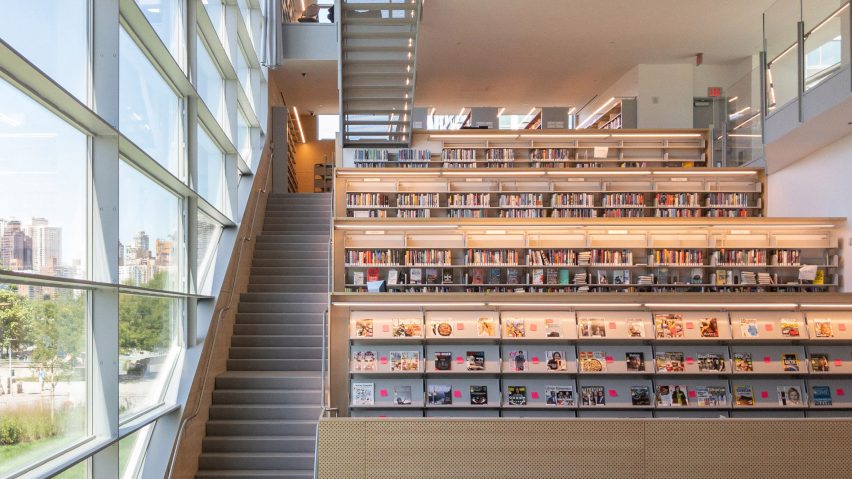In this week's comments update, readers are struggling to understand how the Hunters Point library in Long Island City passed building approval with many areas not accessible to people with disabilities.
Access denied: commenters are frustrated to discover the recently opened Hunters Point library in Long Island City has a number of areas inaccessible to people with disabilities. Steven Holl Architects has dismissed the issues as "wrinkles normal to the opening of any new building".
"How did it pass building approval?" asked Jacopo. "Accessibility is in the code I don't see how they allowed it in the first place."
JZ continued: "Inaccessible areas are inexcusable and non-negotiable. The Americans with Disabilities Act outlines this clearly. As does the building codes which point to ANSI and ADAAG."
"Inaccessibility constitutes far more than a 'wrinkle' these days," added Geof Bob. "And the fact that this is a new building, not a conversion, makes it even less acceptable. If ever a building type justified the 'form follows function' dictum, surely it is a library."
Benny was also annoyed: "Douchy response by Holl. Designing a portion of the building so as to be inaccessible is just not acceptable, especially in a civic building like a library. How this got by planning and got permitted is bewildering."
This reader summarised most readers' thoughts:
Did Steven Holl Architects make a forgivable mistake? Join the discussion ›
House goals: readers are divided over the Royal Institute of British Architects' choice for the UK's best house of 2019 – a "dream home" built on the "tightest of budgets" by architects McGonigle McGrath.
"Absolutely brilliant," praised Donacio Cejas Acosta.
"I'm desperate to go in there with a can of bright orange paint," said E17 Jack. "But, apart from all the grey, it's a worthy winner. The rest were mostly big budget showing off by self-interested architects. The winner should be chosen to push an agenda."
Chris D was less impressed: "Prisoner Cell Block L – how about some colour?"
"Awarding this pretty ordinary looking house 'house of the year' is a travesty," added Alex Murray. "Since when was getting the most out of a tight budget the principal, or overriding, criterion for excellence in architecture? Must excellence in architecture now be predicated on some criterion that is measurable? Architecture is architecture because it lifts the spirit, otherwise it's just building. Get a grip RIBA!"
This reader was sat on the fence:
Do you think House Lessans is a worthy winner? Join the discussion ›
Island living: visuals have been released showing Thomas Heatherwick's Little Island – formally named Pier 55 park – on New York's Hudson River, sparking debate among readers.
"Heatherwick Studio is positioning itself as the go-to architect for a future when rising oceans will require new ideas in architecture," said Speed.
RTHKO was less kind: "It's cute, sure, but that's not enough to justify its existence."
As was JZ: "Feels exclusive and high-maintenance (possibly a reflection of the client?). It will be also be mobbed like the High Line which has ceased to function even as a flaneuring spectacle."
"I wonder what the entrance fee to this tourist attraction will be," joked Alfred Hitchcock. "Would it not be better located at Coney Island?"
This reader compared the island to something from Star Wars:
What do you think of Little Island? Join the discussion ›
Fishy business: an easily biodegradable material made from fish scales has won its inventor, British designer Lucy Hughes, the international James Dyson Award. Not everyone is impressed though.
"This may be biodegradable but is it compassionate?" asked Susan Liddell. "I see a lot of trauma and suffering associated with this product. Being vegan I am happy to use wrappings made of corn starch, potato starch, apple skin, pineapple leaves, but definitely not fish parts."
Chris D also had concerns: "The irony that the fishing industry is responsible for nearly 50 per cent of plastic in the oceans is lost on her."
"Good for her! Looks like a great idea with long term benefits for both the environment and as a way of helping the transition of the economy from landfill-heavy waste cycles to something more cyclical," said James in contrast.
Martin H was full of praise: "If a student can develop a solution in student digs it begs the question: what have the world's research labs been doing for the past 10 years?"
One commenter was feeling comical:
Has Hughes created "part of a global answer" to single-use plastic pollution? Join the discussion ›

